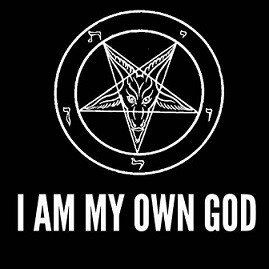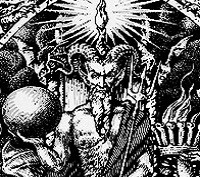Are all Satanists Atheist?
Why does it seem so many Satanists are atheist? One must look at the social origins of Satanism to understand the answer.


The question is often asked, are Satanists atheist?
A document that helped to shine some light on this subject was published in 2001. In this document, ‘Who Serves Satan? A Demographic and Ideological Profile‘, by the sociologist James R Lewis, a nationwide survey asked 140 people what brought them to Satanism and why they became a Satanist.
In this document, it showed that at the time, yes, most Satanists who were asked were interested in ‘non-theistic humanism’, meaning that they were in agreement with atheism1.
Why So Many Satanist Atheists?
All though that study was published some time ago, it shows the general trend towards atheism in Satanism. But why does it seem so many Satanists are atheist? One must look at the social origins of Satanism to understand the answer.
Satanism was influenced by the Church of Satan, and the Satanic Bible, the same book that most of the respondents from that survey had first read which lead them to become a Satanist to begin with.
The Foundation of a Modern Movement
Founded in 1969 by Anton and Diane LaVey, the Church of Satan became a pioneer among new religious movements of the time.
LaVey at first promoted the idea that Satan was equal to the Christian god. In his 1970 interview for the Joe Pyne Show he stated that Satan was a god, just like the Christian god.
Later on his attitude towards Satan as a god had shifted into a metaphor. In an interview for the book, Occult America by John Goodwin, LaVey was asked what Satan represented to him. LaVey stated that his belief in Satan was metaphorical, yet metaphysical as well, saying that Satan is “ Purely symbolically, as the all-pervasive force. The only true God, in fact”.2
From the outset, the basis of LaVey’s philosophy showed that spirituality has dulled our physical senses, showing that spirituality was not the way towards personal enlightenment. In the Satanic Bible he stated that, “Past religions have always represented the spiritual nature of man, with little or no concern for his carnal or mundane needs. They have considered this life but transitory, and the flesh merely a shell; physical pleasure trivial.” 3
It was statements like this they lead LaVey to portray Satanism as an atheistic and materialistic philosophy, divorced from the bonds of spiritual religions. While Satan represented the opposite to the Christian god, LaVey’s philosophy stood against the Christian establishment.
What Satan Represented to LaVey
LaVey also believed that Satan represent the only thing worth being called a god. Further in the interview with John Goodwin he stated, “[Satan is] the adversary of all man-made spiritual religions. To all that we consider the contemptible crutches man has had to invent. We totally reject the concept of there being an antithesis to God. He is God.” 4 Whether LaVey meant this in a metaphysical or spiritual way was unclear.
Michael Aquino, an associate of LaVey, described the inner workings of the ritual chamber in the Church of Satan as rituals that were atheist in nature but performed with psychodrama. This enabled the Church of Satan to broaden its audience to others who might be skeptical of working with magic, ritual and demonic forces.
Beyond this clean image that they wanted to project was the actual experiences of the inner members, who recalled the intense spiritual feelings that occurred during rituals in the church. LaVey was described as being revered by his participants in a special way, as a “high priest in the sincere sense”.
The church during this time was a sort of spiritual release for the members. Aquino recalls, “The church was a place where atheistic and Satanic existed in varying proportions for the entire duration of the Church of Satan..the atheistic argument entered only later as a rationalization.”5 Perhaps it was this atheist kind of thinking that added a dimension of philosophy to their practice.

Satanism Becomes Symbolic
In a later interview with Walt Harrington of the Washington Post, Lavey talked about how Satan had become a symbol and that his religion was nothing more than a simple parody of the Christian Church. LaVey stated about his religion, “Satan is a symbol, nothing more,” Walter concluded in the interview that “LaVey believes in neither God nor Satan, and his Satanic “religion” is a parody of Christianity.” 6
This was of course during the height of the Satanic Panic of the late 80’s, the social panic that gripped the country in fear of Satanists who were supposedly kidnapping children and doing horrific rituals. The Church of Satan and it’s representatives denied being part of any religion as a way to distance themselves from these false accusations.
Their current stance about religious Satanism is that those who do not align with their version of Satanism do not deserve to be called Satanists. As stated by Peter Gilmore, “We consider those who believe in any supernatural demonic entities to be devil worshipers or demonolators, not Satanists.” 7
This seems rather dogmatic considering that the goal of Laveyan Satanism is freeing one’s being from the constraints of religion. Those that practice exclusionary beliefs when it comes to Satanism, like the Church of Satan, and other similar organizations, are also no better than monotheistic religions who also do the same.
It is quite common for different denominations of Christianity to dislike one another, just as it is for Christians in general to dislike any other religion but their own. So this attitude is also common in Satanism, despite trying to divorce themselves from mainstream religion.
Satanism as a Religion and Philosophy
So as we can see, because the majority of Satanists identify with LaVeyan Satanism, it is easy to understand why it is a mistaken belief that all Satanists are atheist. Satanism is in fact, a varied path, that includes those who are theistic, spiritual, pantheistic, and a variety of other spiritual or religious methods.This idea was explored further in my other other essay: Is Satanism a Religion or Philosophy?
Satanism is simply a focus on Satan, whether it’s symbolic or spiritual. There is variety to be found within Satanism, and settling for just one method of expression just because the majority agrees with it, or so that you can feel accepted by others, is leaving out the possibilities that are provided to you. A good place to explore Satanism and it’s possibilities is at the Satanism FAQ page
References:
1. Who Serves Satan? A Demographic and Ideological Profile: http://www.uni-marburg.de/fb03/ivk/mjr/pdfs/2001/articles/lewis2001.pdf – James R. Lewis, Dept. of Philosophy and Religious Studies, Univ. of Wisconsin [PDF] [accessed 7/24/17]
2. Occult America (amazon) by John Goodwin, Chapter 12, Satan in the Suburbs Doubleday; First Edition edition (1972) [accessed 7/24/17]
3. The Satanic Bible, (amazon) Anton LaVey, Pg 26 – December 1, 1976 [accessed 7/24/17]
4. Occult America by John Goodwin, Chapter 12, Satan in the Suburbs Doubleday; First Edition edition (1972) [accessed 7/24/17]
5. Pg 39, The Church of Satan I: Volume I – Text and Plates, (amazon) Paperback – October 31, 2013 [accessed 7/24/17]
6. Walt Harrington in “The Washington Post Magazine”, February 23, 1986. [accessed 7/24/17]
7. Full Disclosure: The Church of Satan, and the paradox of individualist religion, http://www.churchofsatan.com/paradox-of-individualist-religion.php [accessed 7/24/17]
Return to the Satanism Essays Page
Share this essay if you liked it:


















